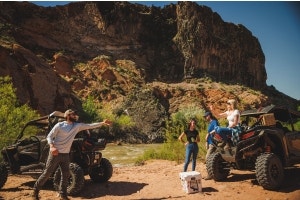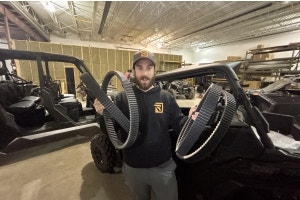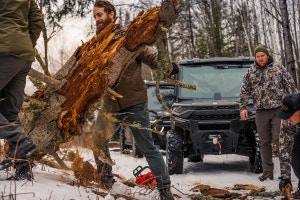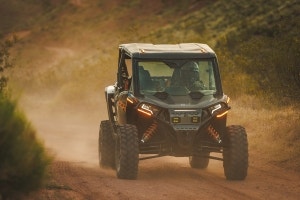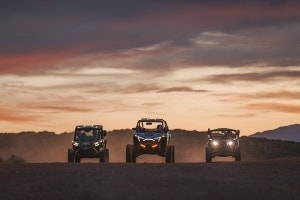Inside UTV Trail Maintenance: A Rider's Guide to Getting Involved

Ever wonder how your favorite trails stay rideable year after year? I'm Brandon from RAVEK's Sales team, and after decades of riding and maintaining trails in Wisconsin, I've learned that great trails don't just happen – they're the result of dedicated local clubs and volunteers putting in the work. Let me walk you through how to get involved and why it matters.
Getting Started with Trail Clubs
When I first looked into joining a trail club, I focused on one simple question: Where do I ride most often? Here in Wisconsin, we have a unique setup where ATV, UTV, and snowmobile clubs often share many of the same trails. During winter, you might be riding your UTV on what's normally a snowmobile trail, as long as your machine is under the weight limit.
My approach was practical – I joined two different clubs at about $35 each, then figured out which one gave me the best return on investment. Why pay dues to a club in southern Wisconsin if I never ride there? Instead, I put my membership dollars where I actually ride.
What sold me on joining was the direct impact of my contribution. That $35 membership fee? It goes straight to things like:
- Fuel for maintenance equipment
- Tools for trail work
- New groomer sheds
- Emergency repairs
Plus, there's a nice bonus: Club members usually get significant discounts off their trail passes. In Wisconsin, you need both registration and a trail pass for your machine, so those savings add up fast.
Local Club Spotlight
- Musky and Snow: Our local club that maintains crucial trail networks
- Birchwood Bobcat Riders: Known for their Tuesday group rides
- Rice Lake Snow and Dirt Club: Organizes rides every other Thursday
- Sawyer County Snowmobile ATV Alliance: Coordinates multiple smaller clubs under one umbrella
Inside a Trail Club: What Really Happens
Let me break down what happens once you're in a club. We have monthly meetings, but don't worry – they're not just people sitting around a table. These meetings are where the real work gets planned.
In a typical meeting, we'll cover:
- Trail conditions and needed repairs
- Potential trail openings or closures (this happens more than you'd think as land gets sold)
- Permission updates from landowners
- Rerouting trails when needed
- Budget discussions
- Upcoming group rides
One thing I've learned: when landowner permission changes, it's all hands on deck. We might need to go out and ask new landowners for permission or completely reroute a trail. It's a constant process of maintaining relationships with the community.
How Clubs Stay Funded
You might be wondering how we keep the lights on. Walk into any local bar or establishment around here, and you'll likely find books of raffle tickets for sale. These fundraisers are crucial. For example, I recently saw one offering only 300 tickets at $50 each, with a $4,000 cash option. This money goes directly into maintaining our trails.
But it's not just raffles. We get support from:
- State recreational funds (yes, dedicated from the state of Wisconsin)
- Membership dues
- Local business partnerships
- Community fundraising events
The Real Work: Trail Maintenance Stories
Let me tell you about the winter of 2022 – that'll give you an idea of what trail maintenance really looks like. We had what people call a "good" snow year, but that meant heavy, wet snow that absolutely devastated our trails. My dad, my wife Stacy, and I spent three full days clearing just three miles of trail. Trees were bent over, big ones had snapped off – it was a mess. But that's what it takes sometimes.
I've learned that trail maintenance isn't just about clearing fallen trees. We deal with:
- Missing or damaged signs (sometimes people deliberately bend them down – not cool)
- Trail erosion that needs gravel fill
- Corner widening for safety
- Stump and rock removal
- Bridge repairs
- Annual spring cleanup
Communication is Key
Here's how we stay coordinated:
- Facebook: Our club is pretty active here, posting about events and work nights
- Email updates: Our secretary keeps everyone in the loop
- Text groups: I'm in constant contact with Tim, our trail captain, especially during riding season
- Direct communication: When there's an issue, we need to move fast
Speaking of fast responses – here's a quick story about why this matters. A couple years ago, I nearly blew through an intersection because there was no stop sign. I immediately called Tim, and by the time I got back with a sign, another club member had already handled it. That's the kind of response time that keeps riders safe.
The Social Side of Trail Maintenance
Here's something they don't tell you when you join: you're going to make some real friends. I've gotten to know guys like Tim Davidson, our trail captain, through regular trail work. We talk at least monthly about trail conditions, and he'll often bring his skid steer out to help brush trails.
Local businesses recognize us too. Bar and resort owners around the area know we're keeping the trails that bring them customers in good shape. It creates a network of people looking out for each other.
Why This Matters
We get riders from all over – Iowa, Illinois, Michigan, even Kentucky – coming up to ride our trails. Without volunteers maintaining these trails, they wouldn't exist. When my dad says "many hands make light work," he's not kidding. The more people we have helping, the quicker we can clear trails, move trees, and keep our trail system running smoothly.
Want to Get Involved?
If you're thinking about joining a club, here's my advice:
- Find the club that maintains the trails you actually ride
- Show up to a meeting – just listen at first
- Join a group ride to get to know people
- Start helping with maintenance – we'll teach you what you need to know
- Bring your friends – like I said, more hands make lighter work
Remember, every time you're out enjoying a great ride, someone volunteered their time to make that possible. Why not be part of keeping these trails going for the next generation of riders?
Need gear for trail maintenance? Good lighting is essential for early morning or evening work. Check out our RAVEK Trunk Bed Light and Apex Lights – they're built tough enough for Wisconsin winters, and I should know – I use them myself.

